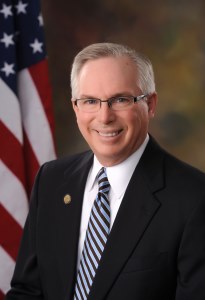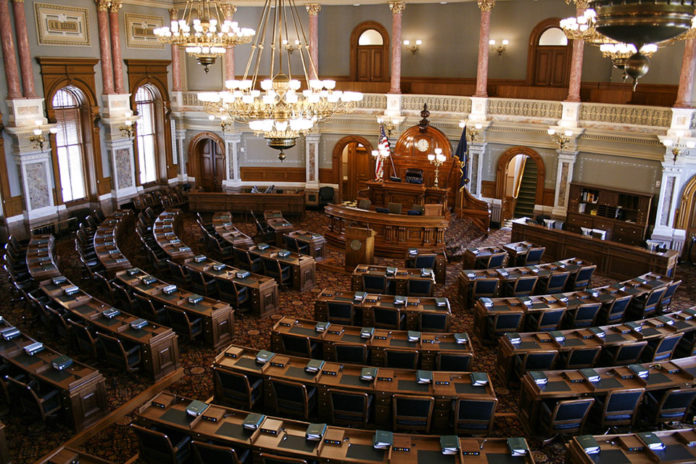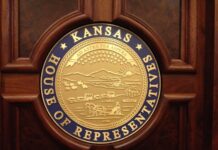Maybe moderate voters just aren’t as angry any more. Or maybe conservatives are just angrier.
Two years after moderate Republicans swept into the statehouse promising to repair a state government crippled by deep tax cuts, they were dealt defeats in a primary election where conservatives took back seats they lost in 2016.
Overall, conservatives defeated five moderate incumbents in last week’s Republican primary, including four who were elected in the moderate wave two years ago. A sixth moderate, state Rep. Steve Becker, trails by five votes and must wait until provisional ballots are counted late this week.
Conservatives won two other seats that were held by moderates going into the election. Meanwhile, conservatives lost just two of the 11 seats they were defending.
The losses came as the state’s future seemed to be brightening for moderates who thought their policies were righting a ship that had been foundering.
Revenues are flourishing. More money is going to into schools. The state’s credit rating is improving. And former Gov. Sam Brownback is gone.

“People weren’t mad anymore,” said Stephanie Sharp, a Johnson County consultant who advises moderate candidates.
“Moderates thought that now that Brownback is gone, that they started fixing the budget and things are looking up. It’s done now, it’s fixed,” Sharp said. “They were content again.”
Sharp said moderates tried to convey there was still more work to be done to stabilize the state’s financial position and bolster taxpayer services, but that message got lost amid the positive headlines in recent months.
Meanwhile, conservatives went on the offensive, attacking moderates for their 2017 vote to reverse the Brownback tax cuts and a controversial faith-based adoption bill that critics said discriminated against LGBT parents.
Conservatives revved up their base with messages of a retroactive tax increases, religious freedom and candidates whose voting records were out of sync with their more conservative district.
All five moderate incumbents who lost – Joy Koesten, Patty Markley, Anita Judd-Jenkins, Mary Martha Good and Don Schroeder – voted to repeal the Brownback tax cuts. All of them, but Schroeder voted against the adoption bill.
Both of those votes fueled the fire for conservatives in the primary, said Eric Teetsel, president and executive director for the Family Policy Alliance, which targeted 10 races including five or six incumbent Republicans.

“What gets people out to vote is frustration and anger more than anything,” Teetsel said. Conservatives “looked at some of these votes and said, ‘That’s unacceptable.’”
Conservative groups immediately started campaigning on the tax vote, shortly after it passed in 2017. They continued to pound away at the messaging – highlighting the fact that it was a retroactive – through the primary campaign.
“There was just a lot more energy on the right,” said Jeff Glendening, state director for the Kansas chapter of Americans for Prosperity. “The right was pretty excited to vote out people who voted for the retroactive tax increase.”
The 85-member House GOP caucus is now split between 44 conservatives and 41 moderates although the margin can be fluid depending on the issue. And while a bloc of moderates lost last week, the final margin won’t be known with certainty until after the general election.
Two districts held by conservatives – Kevin Jones and John Whitmer – were won by moderate candidates but still face Democratic opposition in the fall. And outgoing state Rep. Clay Aurand’s successor is expected to be more moderate than the incumbent.
“Two years ago, there was a large groundswell of anti-Brownback fervor,” said House Majority Leader Don Hineman. “That fervor has died down somewhat now.”

In interviews conducted within the last week, several explanations started to emerge about why conservatives were able to turn the tables on moderates, who just two years ago enjoyed great success at the polls. Consider:
- Conservative turnout was driven up as Republican Gov. Jeff Colyer and Secretary of State Kris Kobach spent millions trying to get their supporters out to vote in the primary. Meanwhile, several outside groups spent tens of thousands of dollars – at least – turning up the heat in House races against moderate incumbents.
- Some moderates were more progressive than the districts they represented. All of the defeated moderates represented House districts that went for President Donald Trump in 2016, a couple of them by as much as 67 percent and 69 percent. Four of them represented districts that went for Brownback in 2014 as well. Only Judd-Jenkins represented a district that supported Democrat Paul Davis in the 2014 governor’s race. “In some races, you saw people who weren’t accurately voting their districts,” said Republican state Rep. Tom Cox of Shawnee.
- Democrats who’ve affiliated as Republicans in the primary in the past didn’t this year because of the first contested gubernatorial primary in 20 years as well as a Democratic primary in the 3rd Congressional District.
Brandi Fischer, executive director of the MainStream Coalition, points out that turnout in some House races was higher in 2018 than it was 2016, something she attributes to the vigorous Kobach/Colyer race.
In some cases, there was a marked increase in voter turnout in House races that did not benefit the incumbents whose vote totals stayed relatively flat from two years ago.
For instance, there was a 26 percent increase in the number of votes cast in Koesten’s race against conservative challenger Kellie Warren in House District 28. But Koesten’s vote total didn’t improve, but slipped slightly.
Koesten’s unofficial vote total – 1,534 – was close to the 1,591 she received two years ago against incumbent Jerry Lunn. But Warren won the race with 2,156 votes.
A similar situation occurred in Markley’s race in House District 8 where there was a 30 percent increase in the number of ballots cast this year from 2016.

Like Koesten, Markley’s unofficial vote total of 1,460 was just 86 fewer votes than she received in 2016. Conservative challenger Chris Croft won the primary in District 8 with 2,004 votes.
“I think we saw a real push with ultra-conservative turnout in those stronger red districts,” Fischer said. “It really came as a testament to the Kobach folks getting their people out and the Colyer folks getting their people out.”
Not in every case where a moderate incumbent lost was there the same kind of increase in voter turnout.
For example, there were fewer votes cast in state Rep. Mary Martha Good’s unsuccessful bid for re-election against Will Carpenter than in 2016. She received almost 600 fewer voters this year than two years ago.
There were about the same number of votes cast in House District 80 where Judd-Jenkins lost to Bill Rhiley. She just received about 330 fewer votes than two years ago when she beat conservative state Rep. Kasha Kelley.

Two years ago, Glendening said, there seemed to be a malaise that hurt conservatives in the primary.
“Conservatives two years ago weren’t motivated,” he said. “They certainly were this time.”
Two years ago, Cox said moderates beat conservatives who mounted lackluster campaigns.
“A lot of us beat really bad candidates, people who never went out into the district, who had never had serious challengers before, who weren’t going to go knock on doors and had no clue how to run a campaign,” he said.
Perhaps a lack of enthusiasm – not political ideology – is what hurt moderates this cycle.
“I definitely felt less of that angry energy going into this election around the legislative races,” Fischer said. “I think so much of that angry energy is focused nationally. Maybe we only have so much bandwidth to be angry.”
















